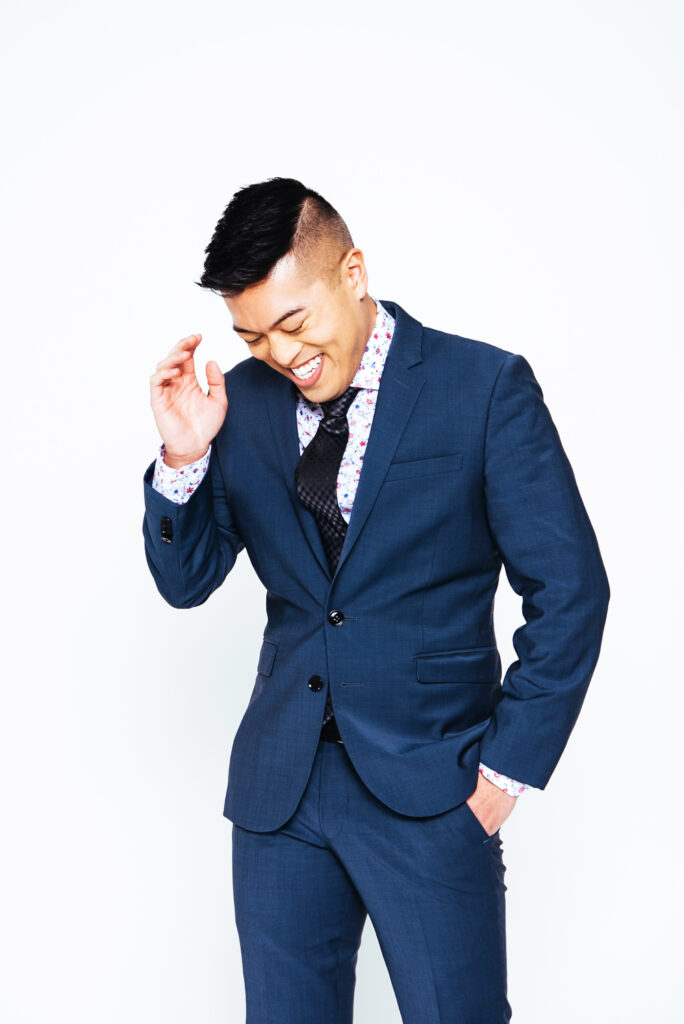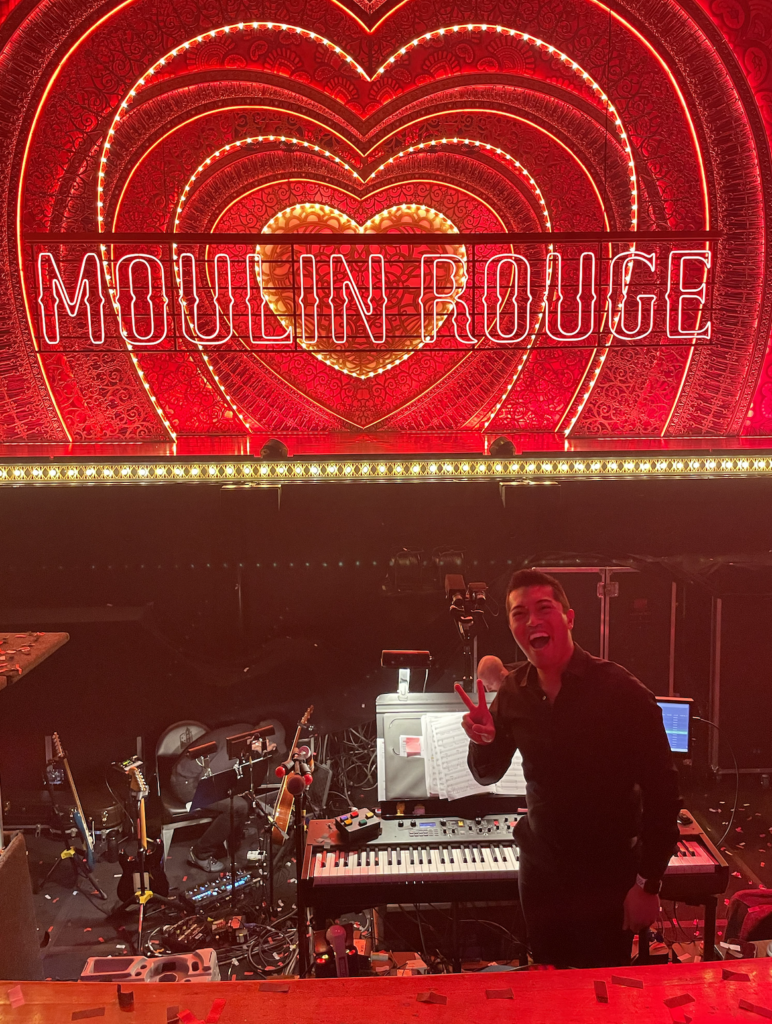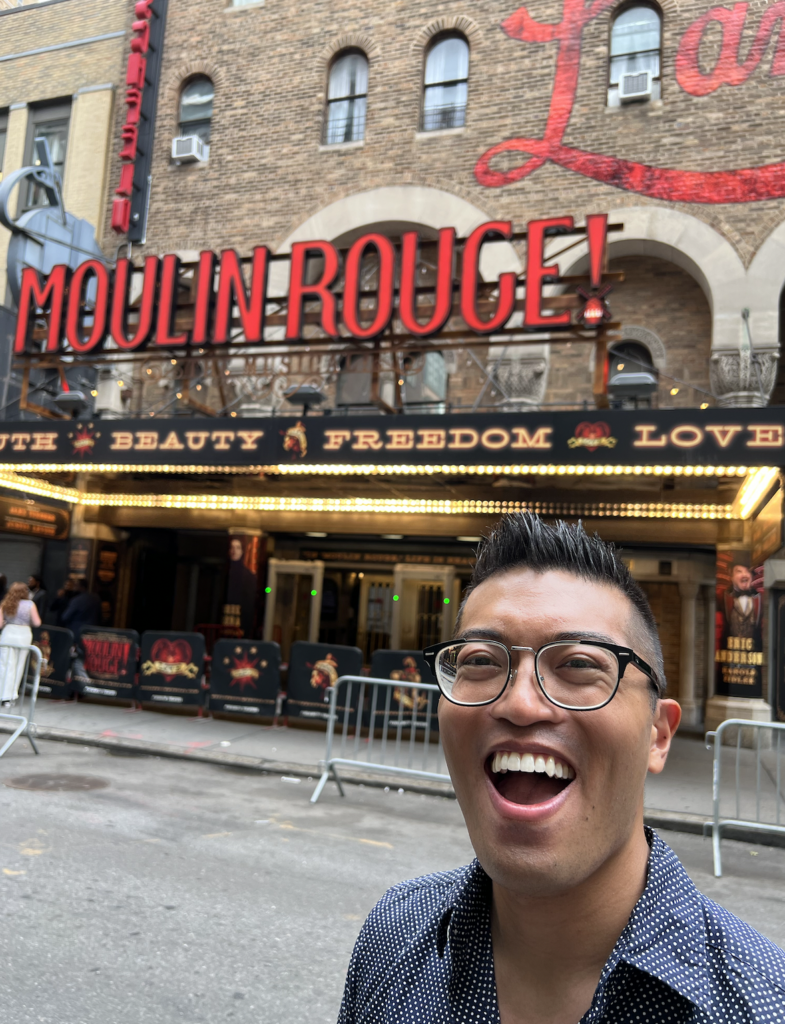Cuevas ’08 on Broadway, and AAPI Activism

Steven Cuevas ’08 is breaking ground as a Filipino-American music director/musician on Broadway.
Cuevas spoke with Emerson Today about the impact he’s leaving for future generations, raising money for Stop AAPI Hate, and what it’s like to be an Asian American working on Broadway.
What was your major?
A BFA in Musical Theatre and a minor in Hearing and Deafness.
How does your Emerson experience benefit you professionally and/or personally?
I don’t think I knew what I wanted to do or become before I went to Emerson. Theatre was a hobby and an obsession of mine — just in a nerdy sense. I didn’t even think that it was something I could do professionally, or that I was even good enough to do it professionally.
When I went to Emerson, and took my studies there, I sort of discovered myself and what I was actually good at. What I realized I was good at was different than what I entered majoring at Emerson. I got a degree in Musical Theatre, but these days I mainly do music direction and work on the music department of shows, which is not technically what I studied at Emerson. Everything I learned at Emerson has brought me to where I am today. I still use everything I learned, and I’m grateful for my time at Emerson. I learned a lot.
How did you end up working as a musical director?
I identified and was inspired by two of the music directors in the Emerson Performing Arts Department: [Senior Artist-in-Residence] Jonathan Goldberg and [Professor Emeritus] Scott Wheeler. I studied music all my life. I started playing piano when I was 3, and I’ve played violin since I was 6 or 7. I always sang in choirs. Music was always part of my life even before theatre. So those two people within the theatre department were sort of music directors of my studio, and they helped me see that there is a side of musical theatre that just deals with the music.
And also, my first job out of college was at a summer stock theatre for someone to be in a resident company, but also the music director of a children’s show. When I auditioned for this theatre, I said, ‘I have the skills to do this.’ I got the job, and at the end of the summer, the producer said he was hiring someone as main stage music director for the next summer. So that started my pathway. After that I still did some stage performances. I eventually got my equity card, and got a lot more jobs as a musician and music director. I just followed where it took me.

You were the music director for a virtual all-Asian production of A Gentleman’s Guide to Love and Murder, and raised more than $25,000 for Stop AAPI Hate during the pandemic. What did it mean to you to have the production be a fundraiser for Stop AAPI Hate?
I was approached by people who were putting it together. They formed this group CollaborAzian. It came out of a response to all of the negativity and hatred towards the Asian community during the pandemic. The focus of the production was to show Asian artists doing what they don’t usually get hired to do in all departments.
Asian actors are typically not cast in roles for the show. We wanted to showcase that Asians could play these roles. It’s a musical comedy and provided levity and comedy during that time. It meant so much to the theatre community, and Asians, and people in general. We actually won an award for it because we raised so much money.
How do you think an all-Asian production of the show varies from others? Did you direct the music with having an all-Asian cast in mind?
It was typical production. These are roles that Asian actors that are not usually seen in. It’s a period piece that takes place in England. Asian performers are never brought in for [productions of the show]. The production just went to show that Asian actors can be funny, do these roles, and seen as leading men and women. We can do anything that other people can do. Asians can be producers – that’s a huge thing—it was produced by all Asians.
Do you feel like you use art to fight xenophobia/racism?
Absolutely. I tell people all the time, students or colleagues, is that people don’t understand my place in theatre. Just for me to be existing in theatre is radical in the theatre world. I didn’t have anyone to look up to when I was growing up. I didn’t think being a music director, or doing theatre in music was a career path. There have been Asian conductors on Broadway, but it’s rare to see them at the podium or in the pit. Sometimes I’m the only Asian in the room. I’ve experienced that a lot during my career.

There’s no room for error if someone is putting themselves out there. There’s no room for mediocrity, so we have to be good or we will be passed up the next time. That’s the reality of it. We’re not allowed to make mistakes. I’m such a big proponent of Asians in the entertainment industry, I love to see them thrive. I know in theatre, it’s common to not be seen at all.
As a music director for existing music, how do you direct it?
It depends upon the director’s vision and the vision for the production. I typically try to honor what we’re collectively trying to do. If that means changing or not changing things in the music, that’s done collaboratively.
What would you like to work on?
I gravitate to things that speak to me. That is so many different shows and sometimes it’s people attached to the program that interest me. Sometimes it’s the music, and sometimes it’s the story. It really depends. I have been lucky that I have worked on many things I’ve enjoyed. And have worked with many people who share a collaborative spirit, are nice and easy to work with. I’ve been lucky the productions that have landed in my lap have mostly been in that ilk.
Do you work with a lot of Emersonians?
Sometimes I do. Not all the time. Emersonians are very talented, so I cross paths with them a lot. Even people I didn’t know personally at Emerson, I see it on their resume or bring it up in conversation. We have shared experiences. It’s great to come across them and to cheer them on.
What are you working on now?
Right now, I am a conductor sub at Moulin Rouge on Broadway. I’m also the keyboard sub for & Juliet, and for Bob Fosse’s Dancin’, and for New York New York.
I’m the understudy for the conductor and also the understudy for the keyboardists. If they can’t do the show, I get a text message asking if I can do the show that night. It happens every so often, and there are planned dates.
I get hired by the conductor or player asking me if I want to sub for them, it’s not done through a casting director. And I have to learn the music on my own. And then I just go on. There’s no rehearsal, I just have to be ready. A lot of people in theatre don’t realize how that works. It’s all done internally for subs, it’s up to me to observe the show. I ask for all the resources. I come see the show. Even if I’m conducting, I need to see what I’m looking for. I sit in the pit and watch the players perform the show, I’m let behind the scenes.
Sometimes I work rehearsals. If I do a rehearsal, that would be as a rehearsal pianist. That’s not practicing, I’m subbing for someone.
What would you ask yourself if you were interviewing yourself?
I would ask myself how did you get to where you are? And my answer would be – I don’t know. I would just say I showed up, and showed what I can do. I was nice along the way and worked well with other people. Those are the qualities I look for in people I work with. Especially now, after learning a lot, and going through an entire pandemic of feelings. There’s really no time to work on things that don’t speak to you — artistically or personally.
Anything else you’d like to say about yourself, your career, or your time at Emerson?
I use everything I learned at Emerson, and in ways I didn’t think I would. Because I have my learning experiences in performing and singing and acting and even dancing, I have learned how to work collaboratively with so many people in different departments. Whether it’s actors, the directors, choreographer, other musicians, or design crew members — Emerson made me know how to speak everyone’s language, or if I didn’t understand what they do, to appreciate what they do, and how to help them collaboratively to make the show a better show.
It has really helped me to work with actors, especially those who may not be highly musically inclined. I’ve worked with so many actors of different levels of understanding of music. I can see what their process is and how to help them understand where I’m coming from, and using their understanding of music and where they come from as a performer. Every show I do is a journey and an adventure. I never know how it’s going to be. It depends upon the people I’m working with. That’s the most important ingredient.
Categories